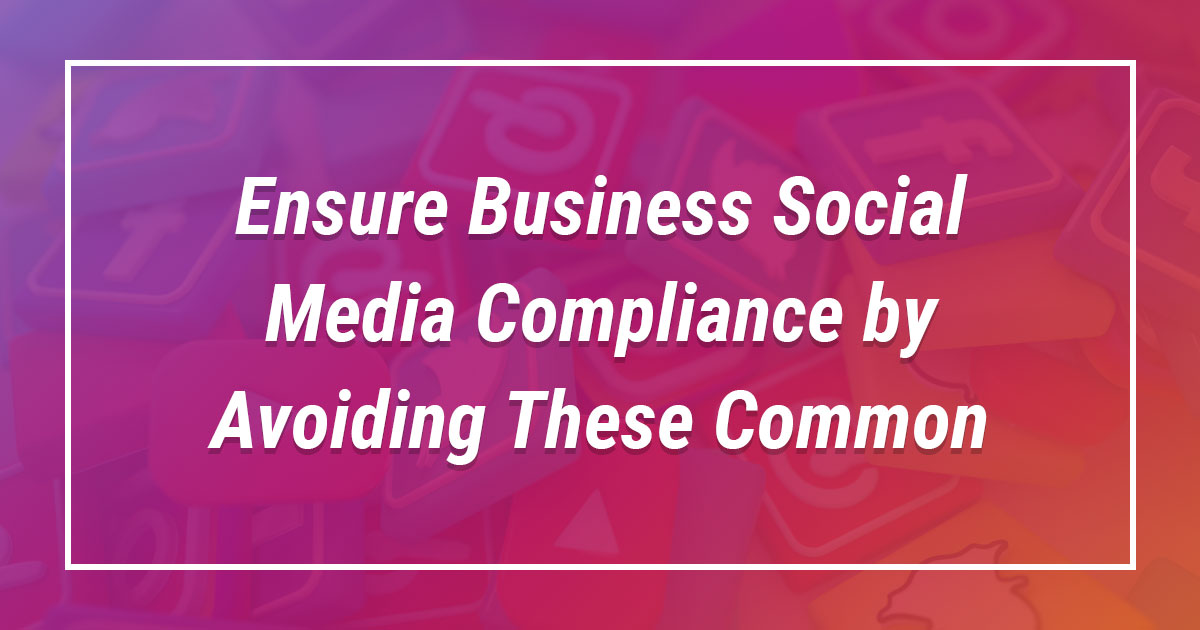As social media for business evolves, so too does legislation. It’s becoming increasingly important for companies to stay up-to-date with regulatory changes.
Social media compliance is about having a social media policy in place, educating employees about social media risks, and involving the legal and compliance departments about social media risks as well.
Let’s take a look at the most common social media compliance risks marketers face.
Data security and privacy threats
While privacy and data security regulations differ by industry, they all have mutual goals. First, they aim to limit the number of people who marketers can contact. Second, they specify how data is collected and stored by marketers. And lastly, they ensure that customers are aware of how their data is saved and used.
The following are some of the notable regulations marketers should know about:
- The General Data Protection Regulation of the European Union (GDPR)
- The California Consumer Privacy Act (CCPA)
- CAN-SPAM Act in the United States
- Anti-Spam Legislation in Canada
- The Children’s Online Privacy Protection Act of the United States (COPPA)
The underlying ideas are often the same. Unsolicited messages should not be sent by online marketers. When they acquire and store personal data, they must notify consumers. They must also ensure that personal information is stored safely and ethically.
The GDPR in particular is quite rigorous when it comes to how advertisers use personal information. These regulations also outline how to tell people while you’re gathering information. This includes the use of cookies and other techniques.
With many different laws and regulations to keep track of, compliance might seem difficult to achieve. However, the consequences of non-compliance are far too severe to ignore. From hefty fines to legal holds, non-compliance can bury your organization in expensive and time-consuming lawsuits.
Confidentiality
Depending on the industry, sharing private information on social media might not only be wrong but also illegal. You must treat customer information with the utmost secrecy. Without specific authorization, you are unable to distribute information or photos.
For example, photos and videos in which a patient or their records can be identified are included in this category for healthcare marketers. HIPAA compliance could be jeopardized by simply resharing a post without signed approval. And the fines can be significant.
The Health Insurance Portability and Accountability Act must be understood by those working in the healthcare industry (HIPAA). It establishes tight guidelines for how businesses use patient health information.
Also, consider educators and those who promote educational institutions. They are required to adhere to rigorous confidentiality guidelines. The Family Educational Rights and Privacy Act is the foundation for these (FERPA).
Archiving and access
Access and accessibility criteria, in general, attempt to guarantee that vital information is accessible.
In healthcare, for example, HIPAA compliance dictates that hospitals, doctors, nurses, and other healthcare providers must store private patient information properly. This information must be available when it’s needed.
Furthermore, ensuring secure communication channels is imperative, prompting healthcare professionals to utilize HIPAA-compliant video conferencing solutions and API by companies like iotum for remote consultations and discussions while safeguarding patient confidentiality.
Companies that manage private data, like banks or credit agencies, also abide by strict archiving laws. They need to protect sensitive information so that only authorized individuals can access it.
If social media compliance is part of your marketing strategy, it’s important to understand what laws are required for your industry. To make compliance easier, implement a social media archiving solution that will help you ensure that all content is being archived properly, stored securely, and can be easily accessed.
Also, remember that social media compliance is an ongoing process. As your company grows, new laws and regulations might be enacted. Sometimes, they might be specific to certain regions, so it’s important to stay up-to-date.
Claims made by marketers
Those in regulated industries are particularly vulnerable to social media compliance issues. However, all social marketers must follow marketing and advertising guidelines. These could come from the Food and Drug Administration (FDA) or the Federal Trade Commission (FTC) (FTC).
The FDA, in particular, keeps an eye on claims made about food, beverages, and supplements. The Federal Trade Commission frequently focuses on endorsements and testimonials. Influencers are frequently used in the social realm to describe this.
Take the Teami case as an example. In 2020, the FTC ordered Teami, a health company, to pay a $1 million fine. A number of social media compliance issues were included in the case.
According to the FTC, Teami made various non-compliant claims about its teas, including its alleged ability to treat and prevent flu, reduce migraines, unclog clogged arteries, and even fight cancer. Teami was sanctioned as a result of these unsubstantiated health and wellness claims.
In addition, Teami was fined for social media posts by influencers. On their influencers’ Instagram posts, disclosures were not prominent enough. Only after selecting “more” could viewers see them.
Over to you
Cases like Teami can teach us a valuable lesson about compliance. The risks are serious and the consequences can be dire. Instead of hoping it won’t happen to your company, be proactive and learn from others’ mistakes. Don’t allow your company to become another example of what not to do.
To avoid social media compliance issues, start by developing a strong social media policy. Educate your employees regularly about the risks of social media. Involve legal and compliance departments early in the process.
Finally, implement a social media archiving solution that will help you ensure that all content is being archived properly, stored securely, and can be easily accessed.


